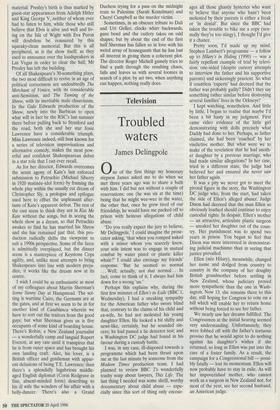Television
Troubled waters
James Delingpole
0 ne of the first things my honorary stepson James asked me to do when we met three years ago was to share a bath with him. I did but not without a couple of reservations: one (he was six at the time) being that he might wee-wee in the water, the other that, once he grew tired of our friendship, he would have me packed off to prison with heinous allegations of child abuse.
`Do you really expect the jury to believe, Mr Delingpole,' I could imagine the prose- cutor asking, 'that when you romped naked with a minor whom you scarcely knew, your sole intent was to engage in mutual combat by water pistol or plastic killer whale?' I could also envisage my friends' response. 'But he seemed so normal .. . Well, actually, not that normal .. . In fact, come to think of it, I always had him down for a wrong 'un.' Perhaps this explains why, during the first few minutes of Ellen's in Exile (BBC 1, Wednesday), I had a sneaking sympathy for the American father who swore blind that, contrary to the claims of his child and ex-wife, he had not molested his young daughter Ellen. He looked a bit shifty and newt-like, certainly, but he sounded sin- cere; he had passed a lie detector test; and a Washington DC judge had found in his favour during a custody battle.
I was, in any case, ill-disposed towards a programme which had been thrust upon me at the last minute by someone from the Modern Times production team. I had planned to review BBC 2's wonderfully trashy soap about lawyers, This Life. The last thing I needed was some shrill, worthy documentary about child abuse — espe- cially since this sort of thing only encour- ages all those ghastly hysterics who want to believe that anyone who hasn't been molested by their parents is either a freak or 'in denial'. But since the BBC had taken the trouble to bike me a copy (nor- mally they're too stingy), I thought I'd give it a chance.
Pretty soon, I'd made up my mind. Stephen Lambert's programme — a follow up to Hilaty's in Hiding (1990) — was a fairly repellent example of trial by televi- sion: one-sided (despite cursory attempts to interview the father and his supportive parents) and sickeningly prurient. So what if countless 'experts' had decreed that the father was probably guilty? Didn't they say something rather similar before destroying several families' lives in the Orkneys?
I kept watching, nonetheless. And little by little, I began to realise that maybe I'd been a bit hasty in my judgment. First came video evidence of the little girl demonstrating with dolls precisely what Daddy had done to her. Perhaps, as father claimed, she had been 'coached' by her vindictive mother. But what were we to make of the revelation that he had anoth- er daughter by a previous marriage, who had made similar allegations? In her case, tried in a different state, the judge had believed her and ensured she never saw her father again.
It was a pity we never got to meet the pivotal figure in the story, the Washington DC judge who, from the start, had taken the side of Ellen's alleged abuser. Judge Dixon had decreed that the man Ellen so obviously loathed should continue to enjoy custodial rights. In despair, Ellen's mother — an attractive, articulate plastic surgeon — sneaked her daughter out of the coun- try. Her punishment was to spend two years in prison. You began to feel that Dixon was more interested in demonstrat- ing judicial machismo than in seeing that justice prevailed.
Ellen (née Hilary), meanwhile, changed her name and dodged from country to country in the company of her doughty British grandmother before settling in New Zealand, whose judiciary proved more sympathetic than the one in Wash- ington. Now 13, she remains there to this day, still hoping for Congress to vote on a bill which will enable her to return home without being forced to see her father.
We nearly saw her dreams fulfilled. The Congressmen at the initial hearing seemed very understanding. Unfortunately, they were fobbed off with the father's tortuous proviso that he would agree to do nothing against his daughter's wishes if she returned, so long as Ellen was put into the care of a foster family. As a result, the campaign for a Congressional bill — possi- bly fatally — lost its momentum. Ellen will now probably have to stay in exile. As will her impoverished mother, who cannot work as a surgeon in New Zealand nor, for most of the year, see her second husband, an American judge. Ellen's in Exile was a sad, moving story very well told. I hope it helps swell the growing body of public opinion both here and, more importantly, in America that a terrible injustice may have been sanctioned by the sometimes astonishingly perverse American legal system. As to the weird antics of our own lawyers, I'll be reviewing This Life in a fortnight.



































































 Previous page
Previous page